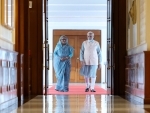Column

Jamaat vows to eradicate Hindus from Bangladesh
Jamaat-e-Islami (JEI) activists have launched jehad against the Hindu minority in Bangladesh soon after the International Crimes Tribunal awarded death penalty to senior JEI leader Delawar Hossein Sayeedi on February 28, 2013 on war crimes charges. Following the verdict, activists of JEI and its student front Islami Chhatra Shibir (ICS) launched attacks on Hindus in different parts of the country. Hindu properties were looted, Hindu houses were burnt to ashes, Hindu temples were desecrated and set on fire.
Reports of torching Hindu of temples, desecration of Hindu deities and holy places, land
grabbing and looting Hindu property and wealth, molesting and raping of Hindu women
and minor girls continue to make headlines of Bangladeshi newspapers almost daily.
But there is no information about arrest of the Islamist perpetrators who have embarked
upon a mission to make the country ‘kafir free’ and Hinduless.
The Hindus are not disclosing identity of the attackers out of fear and also for lack of
security. Despite the government’s promise to stop this onslaught on the minority and
its assurance to protect them, virtually no effort has so far been made to address their
grievances. There are reports that the BNP leaders including Khaleda Zia are reaching
out to them and pledging security to their life and property only if they desist from voting
for Awami League. Hindus in Bangladesh decide the outcome of 35 parliamentary seats
and they are perceived to be the Awami League vote bank.
The BNP-JEI alliance are playing the minority card very tactfully with the goal of teaching
the Hindus that they are not safe in Bangladesh even when Awami League holds power.
If BNP-JEI alliance takes the reins after the next elections it would be better for them
to leave the country. From the very first day BNP workers joined the JEI/ICS activists
in launching unprovoked attacks on the Hindus particularly in villages and small towns
where these organizations have a powerful organizational network.
“We will kill all the ‘Malauns’ (a derogative term used for the Hindus) and Bangladesh will
become Banglastan like Pakistan where only Muslims will live” read a post of the JEI run
web cite Basherkella.
The situation prevailing in the country is reminiscent of the state of affairs that prevailed
after the emergence of Bangladesh when Sheikh Mujibur Rahman declared general
amnesty for the Islamists against whom trials had not been initiated. Sheikh Mujib was
assassinated in 1975 paving the way for a series of military coups and general chaos
that still lasts.
The present Awami League led government seems reluctant to anger the rioting JEI
activists. Political motivations that kept Sheikh Mujibur Rahman from acting against the
radical Islamists in the beginning of the nation’s history hold the present government
hostage still now. Persecution of Hindus in the wake of a setback to an Islamist cause
is happening in the same way as it happened in 1971. Then it was the liberation war to
free from the clutches of Pakistan, negating the concept of Two Nation theory. Now the
reason is justice being meted out to Islamist war criminals.
There is one more aspect to the attacks on the Hindus. Secularist nature of the ongoing
Shahbag movement has prompted Khaleda Zia and leaders of other pro-Pakistani outfits
to denounce the movement. Success of this movement would imply end of the road for
Islamic politics in Bangladesh and this will not be acceptable to the Islamists and their
patrons including Pakistan, Saudi Arabia and other Middle East countries.
Leaders of Shahbag are quoting Shekh Mujibur Rahman to say “first I am a Bengali,
then a Muslim or Hindu, or Buddhist” and this negates the very foundation of Two Nation
theory. The Bengali identity is an anathema to the Islamist forces and their foreign
mentors. Envoys of Pakistan and Saudi Arabia are maintaining close liaison with BNP
and JEI in Dhaka and providing them advice and necessary wherewithal needed to
scuttle the Shahbag movement that has posed a challenge to the BNP and JEI. On the
other hand, the ideals of the Shahbag movement - Bengali nationalism, Secularism and
Democracy - have put the Awami League in an advantageous position ahead of the next
parliamentary elections.
The Awami League has remained the most credible vanguard of secular politics in
Bangladesh. The party seems to be reluctant to act against perpetrators of attacks on
Hindus for fear of antagonizing the radicalized sections prior to the elections.
For most part of independent history of Bangladesh the Awami League that has
contributed to make Bangladesh a liberal Muslim majority State has faced violent
challenges from the Islamist nationalist and pro-Pak forces represented by BNP and
JEI who do not believe in the concept of democracy and wish to capture state power
in the name of Islam. Certain sections of the armed forces, some mercenary elements
and sections of pro-Pak political entities have often come together to subvert institutions
of democracy and hijack State power to use it for their selfish gains. By indulging in
continued violence targeting the Hindus, the BNP-JEI alliance hopes that prolonged
political turmoil and uncertainty would encourage the Islamist elements in the Army to
stage a coup and take over power from the Awami League government.



